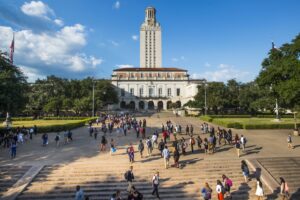AUSTIN, Texas—Lower-limb amputees may soon be walking more easily, thanks to new studies of prosthetics by Dr. Rick Neptune, a mechanical engineering assistant professor at The University of Texas at Austin.
With a $400,000 Faculty Early Career Development (CAREER) award from the National Science Foundation, Neptune will create computer models of amputee walking patterns while using a prosthesis. The competitive five-year award, offered to tenure-track assistant professors, “recognizes and supports the early career-development activities of those teacher-scholars who are most likely to become the academic leaders of the 21st century.” A CAREER award is one of the most prestigious grants a young researcher can receive.
Neptune says prosthetic designs have shown limited success in improving an amputee’s ability to walk. Engineers have been unable to identify the relationship between the prosthesis design and the user’s resulting gait pattern because of the incredible adaptability of the human nervous system, he says.
“If you change a characteristic of a prosthetic foot and go into a lab to make gait measurements, there’s a difference in performance. But is the difference due to the new design or the neuromotor adaptations the amputee used in response to the new foot? It’s kind of the chicken or the egg problem,” says Neptune.
Neptune and his research group plan to use computer models of amputees walking to understand how individual muscles work together in synergy to produce the gait pattern. These models will allow Neptune and his group to look for causal relationships they can’t identify experimentally. For example, with a model they could change design characteristics of the prosthesis, but keep the muscle coordination pattern the same and see the affect on performance. Eventually, the researchers will make prototypes of prostheses and have amputees use them and assess their performance.
One of the goals of Neptune and his group is to design a new prosthesis to help reduce the joint disorders that occur in the intact limb caused by excessive “limb loading.” These joint disorders occur when unsuccessful amputees lean on their intact limb when they walk and create larger joint loads than in the limb with the prosthesis. In three to five years, patients develop additional musculoskeletal disorders in the intact limbs that often become more debilitating than their amputation.
In addition, Neptune’s group plans to measure muscle coordination patterns in walking amputees to determine which muscle groups are used to compensate for the amputation. The engineers will then compare successful amputees—those who can walk symmetrically, at a normal pace, after being fitted with a prosthesis—with unsuccessful amputees and identify the common threads between the groups. If these threads exist, Neptune believes they could have important implications for rehabilitation.
For the educational component of the grant, Neptune will develop two new college courses and a middle school teaching unit. His new graduate course in biomedical device design and evaluation will emphasize an interdisciplinary approach to projects that help persons with disabilities. His undergraduate course will focus on developing new biomechanics projects. He will also create a set of biomechanics-based projects for The University of Texas at Austin’s Society of Women Engineers middle school girl summer program whose goal is to inspire an interest in science and engineering.
For more information contact: Becky Rische, College of Engineering, 512-471-7272.



